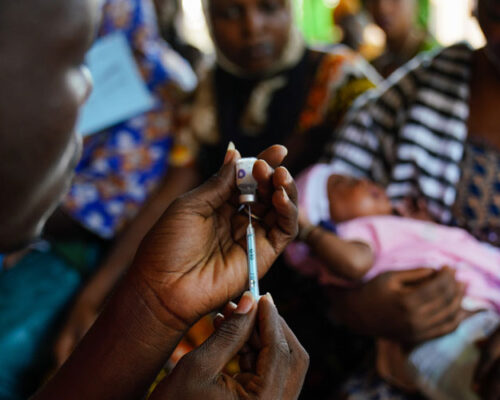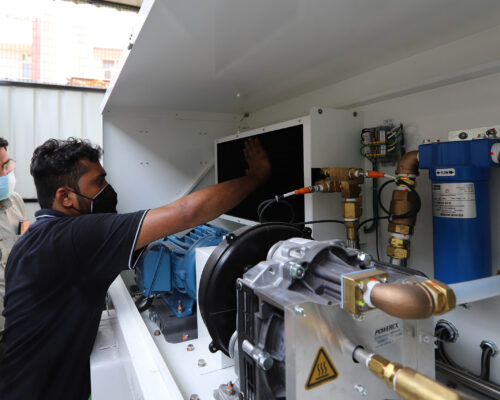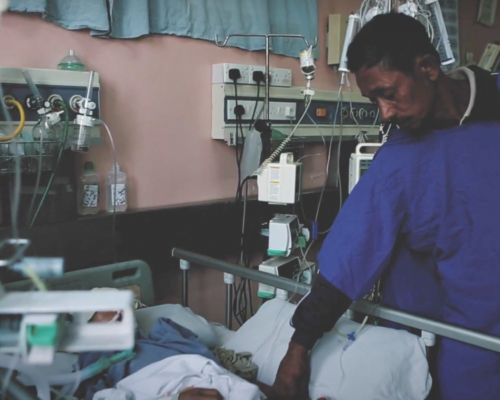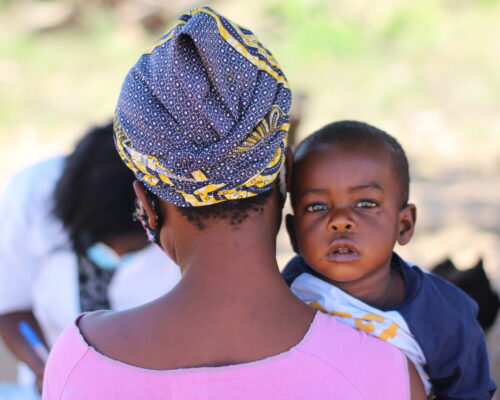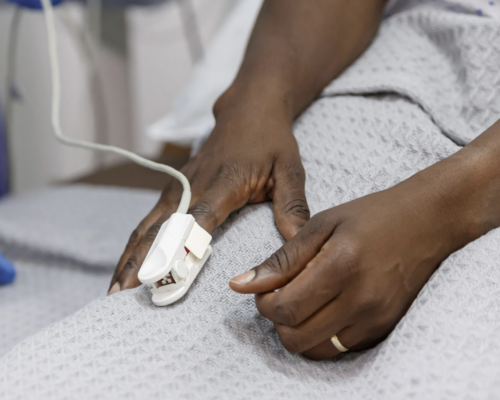
World Pneumonia Day 2021
Pneumonia is the biggest infectious killer of adults and children – claiming the lives of 2.5 million, including 672,000 children, in 2019. This year, World Pneumonia Day, on 12 November 2021, is held during COP 26 – the UN Climate Change Conference. This is a critical moment to bring together the health, air quality. and climate communities to tackle the biggest infectious killer on the planet.
Air pollution is the leading risk factor for death from pneumonia across all ages. Almost a third of all pneumonia deaths – 750,000 – were attributable to polluted air in 2019. Household air pollution contributed to 420,000 of these deaths, while outdoor air pollution contributed to 330,000.
It is the very young and the very old who are at greatest risk. Children are more susceptible to household air pollution in homes that regularly use polluting fuels and technologies for cooking, heating, and lighting. While outdoor air pollution, especially from pollutants emitted by industries and car exhaust smoke, disproportionately affects respiratory health among older adults.
Ninety per cent of air pollution-related deaths are concentrated in 40 lower income countries. In many African countries, air pollution contributes to more than 50% of all pneumonia deaths. And while pneumonia deaths from household air pollution are declining in Africa, they are tragically increasing as a result of outdoor air pollution. This is also true for Asia.
The need for clean air action is clear. Reducing air pollution will deliver significant benefits to health and the environment. This World Pneumonia Day, Every Breath Counts is calling on governments with heavy burdens of pneumonia and air pollution to commit to reducing air pollution-related pneumonia deaths by 50% by 2030.
Read our Air Pollution and Pneumonia Scorecard which ranks the 40 countries with the most air pollution-related deaths here.
Watch our COP 26 event, Air Pollution, Climate Change and Health – Connecting the Dots on World Pneumonia Day.
RESOURCES
Events
- Childhood Pneumonia & Quality of Care, Results 4 Development
- The Future of Pneumonia Prevention, IVAC/JHU
- The Double Burden: Pneumonia & COVID-19 and the race to close the oxygen access gap, Australian International Development Network
- World Pneumonia Day Conference on Pneumonia and Air Pollution, PneumoLight and Every Breath Counts
- Air Pollution, Climate Change & Health: Joining the Dots on World Pneumonia Day, COP26 WHO Health Pavilion
- Addressing the leading killer of children from a preventable cause and accelerating PCV coverage in Asia, Save the Children
- Pneumonia and the need for Cleaner Air & Climate Action, Lung Care Foundation, Indore, India
- Every Breath Counts Research Priorities Webinar
Country commitments
- India: Pneumococcal Conjugate Vaccine (PCV) available to all children across India
- Democratic Republic of Congo: Health minister sets up oxygen taskforce with aid agencies and the private sector to produce more oxygen in DRC’s 26 provinces
- Chad and Ethiopia – Ministries of Health agree to improve pneumonia control plans as part of broader child survival strategies
- Nigeria – Health Minister renews commitment to implement the Nigerian Integrated Pneumonia Control Strategy and Implementation Plan and the Global Action Plan on Pneumonia and Diarrhoea (GAPPD)
- Somalia: Health Minister announces more resources for child health and reaffirms commitment to PCV introduction and developing a pneumonia control strategy
Reports
- The Missing Piece: Why the Pandemic is an inflection point for Pneumonia Control, Every Breath Counts
- Pneumonia & Diarrhoea Progress Report 2021, IVAC, John Hopkins University
Newsletters
- Pneumo-Watch INSPIRING newsletter, Save the Children Nigeria
- Pneumo-Watch INSPIRING newsletter, 2nd edition, Save the Children Nigeria
- Pneumo-Watch INSPIRING newsletter, 3rd edition, Save the Children Nigeria
Articles
- Ending the Permanent Respiratory Disease Pandemic, Project Syndicate, Every Breath Counts
- Respiratory syncytial virus: promising progress against a leading cause of pneumonia, Lancet Global Health, Amy Ginsberg et al
Press releases
- Nigeria has highest number of air pollution-related child pneumonia deaths in the world, UNICEF Nigeria
- Call to increase funding for oxygen response, UNITAID
- Global Efforts must be strengthened to end the preventable burden of pneumonia, FIRS
- India completes national introduction of pneumococcal conjugate vaccine, Gavi
- Number of African Children receiving pneumonia vaccines falls for the first time in four years, Save the Children
Blogs
- Clean Air critical to reducing pneumonia deaths, Every Breath Counts Pneumonia and Air Pollution Scorecard 2021
- What pneumonia can teach us about COVID-19, PATH
- Investing in oxygen before the pandemic gave Ethiopia a head start in its COVID-19 response, CHAI
- Broken oxygen equipment cost children’s lives at hospitals in Kano, Nigeria. We developed a fix, CHAI
- Oxygen 101: An Explanation of the Oxygen Gap, Assist International
- Why we need medical gas companies to help close oxygen gaps, Access to Medicine Foundation
- Unitaid marks World Pneumonia Day and calls on all partners for more funding to the oxygen response, Unitaid
- Pneumonia takes the life of a child a minute – this is how most of these deaths can be prevented, UNICEF
- Clean Cooking Reduces Household Air Pollution- A Leading Cause of Pneumonia, HAPIN Study
Podcasts
Videos
- Sickness and survival in pre-COVID-19 Nepal. IVAC/Gavi
- Studying the effects of PCV in Kenya, Pneumococcal Conjugate Vaccine Impact Study, Kemri Wellcome Trust
Read more about World Pneumonia Day 2020!
The Promise of Reduced Dose Pneumococcal Vaccination for Children
Pneumonia is the leading infectious cause of death in children under five and, as a result, the pneumococcal conjugate vaccine, or PCV, is one of the most lifesaving vaccines. However, just six in every ten children are protected with PCV well below the global target...
17 March, 2024A2O2 Resource Library
The A2O2 Resource Library is a platform for all things oxygen - covering every aspect of the oxygen ecosystem from planning to equipment to patient care.
10 May, 2023You paid WHAT?
For the more than 400 million adults and children who get sick with pneumonia each year, the costs of treatment can be catastrophic - as individuals and families are forced to pay out-of-pocket for healthcare. Every Breath Counts is launching a new campaign to document these crippling costs.
09 December, 2022Antimicrobial resistance and pneumonia
How do we reduce inappropriate use of antibiotics for the treatment of pneumonia and close any remaining access gaps for pneumonia patients, especially children, who are missing out?
18 November, 20222nd Global Forum on Childhood Pneumonia
The 2nd Global Forum on Childhood Pneumonia built on the momentum for action generated by the first Forum in 2020, enabling countries to rapidly reduce child pneumonia deaths and accelerate achievement of the child survival SDG.
13 November, 2022Pulse oximeters that work for everyone
There is growing evidence that pulse oximeters do not work effectively on darker skin tones. This is unacceptable. Every Breath Counts has launched a petition to change this.
10 October, 2022


